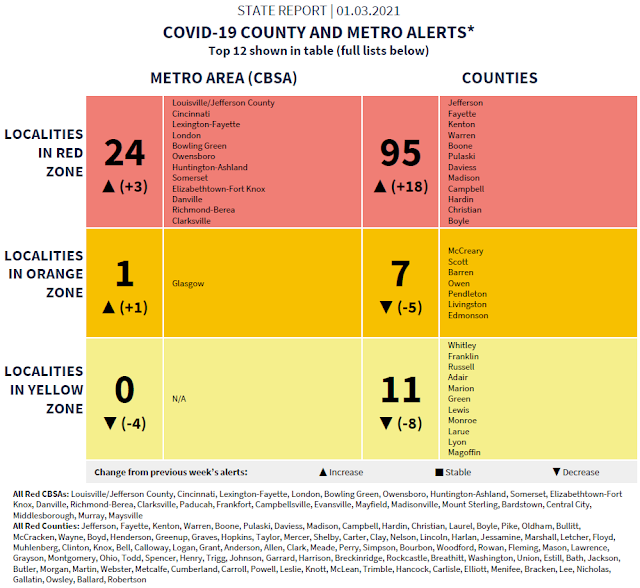
White House Coronavirus Task Force table; for a larger version, click on it.
—–
By Al Cross
Kentucky Health News
The novel coronavirus is spreading so fast among Americans that federal officials suspect a new, more contagious strain of the virus has evolved in the U.S., in addition to the more virulent strain that has already spread here from the United Kingdom.
That possibility is mentioned in the latest report from the White House Coronavirus Task Force, the Kentucky version of which was released Tuesday night by the state Cabinet for Health and Family Services.
“This fall/winter surge has been at nearly twice the rate of rise of cases as the spring and summer surges,” the report says. “This acceleration suggests there may be a USA variant that has evolved here, in addition to the UK variant that is already spreading in our communities and may be 50 percent more transmissible.”
The report continues, “Aggressive mitigation must be used to match a more aggressive virus. Without uniform implementation of effective face masking (two- or three-ply and well-fitting) and strict social distancing, epidemics could quickly worsen as these variants spread and become predominant.”
The report also warns, “Kentuckians must understand that if they were around people outside of their household during the holiday season, they must get tested.”
More strains are likely to arrive in the U.S., Michael Osterholm, director of the Center for Infectious Disease Research and Policy at the University of Minnesota, said on CNBC‘s “Squawk Box.” He said the U.K. strain is “the first of what will likely be a number of these strains that are emerging.”
The U.K. strain doesn’t appear to make people sicker than other strains, but does appear to spread more easily, Centers for Disease Control and Prevention officials said last week. They said they think the two vaccines are effective against it, and are trying to confirm that, partnering with academic centers to test samples around the country.
The White House report advised Kentucky health officials to focus their public messaging “on proactive testing of those under 40 to prevent asymptomatic silent spread to their household members, and on a call to action for immediate testing and rapid infusion of monoclonal antibodies for those at risk for severe disease. Every hospital should have outpatient infusion sites immediately available to save lives.”
The report also recommends “creation of high-throughput vaccination sites with use of EMT personnel to monitor for potential anaphylaxis [negative reactions] and fully utilize nursing students,” presumably to administer vaccinations. “No vaccines should be in freezers but should instead be put in arms now; active and aggressive immunization in the face of this surge would save lives.”
Gov. Andy Beshear said Monday that he and Health Commissioner Steven Stack are unhappy with the slow pace of vaccinations in Kentucky, and offered a new plan to speed it up. Stack said the goal is for vaccination providers to administer 90% of doses in their possession within a week of those doses arriving, even if they don’t go to the group that they are designated for. He said, “The goal is to not have vaccines sitting in a freezer.”
The report for Kentucky covers the week of Saturday, Dec. 26 through Friday, Jan. 1, a holiday period that may have caused a surge in cases and certainly an increase in the percentage of Kentuckians testing positive for the virus, which state officials initially said could be due to a higher percentage of tests being done in medical facilities, which are more likely to test people who have symptoms and the virus.
The report puts 95 of the state’s 120 counties in the federal red zone, the highest yet and 18 more than the previous week. The zone is for counties with 101 or more new cases per 100,000 population during the week.
“Data reporting has been unstable for the past week, but hospital reporting has been stable,” the report says, and the numbers are up. “Between Dec. 26 and Jan 1, on average, 436 patients with confirmed Covid-19 and 128 patients with suspected Covid-19 were reported as newly admitted each day to hospitals in Kentucky. This is an increase of 8% in total new Covid-19 hospital admissions.”
